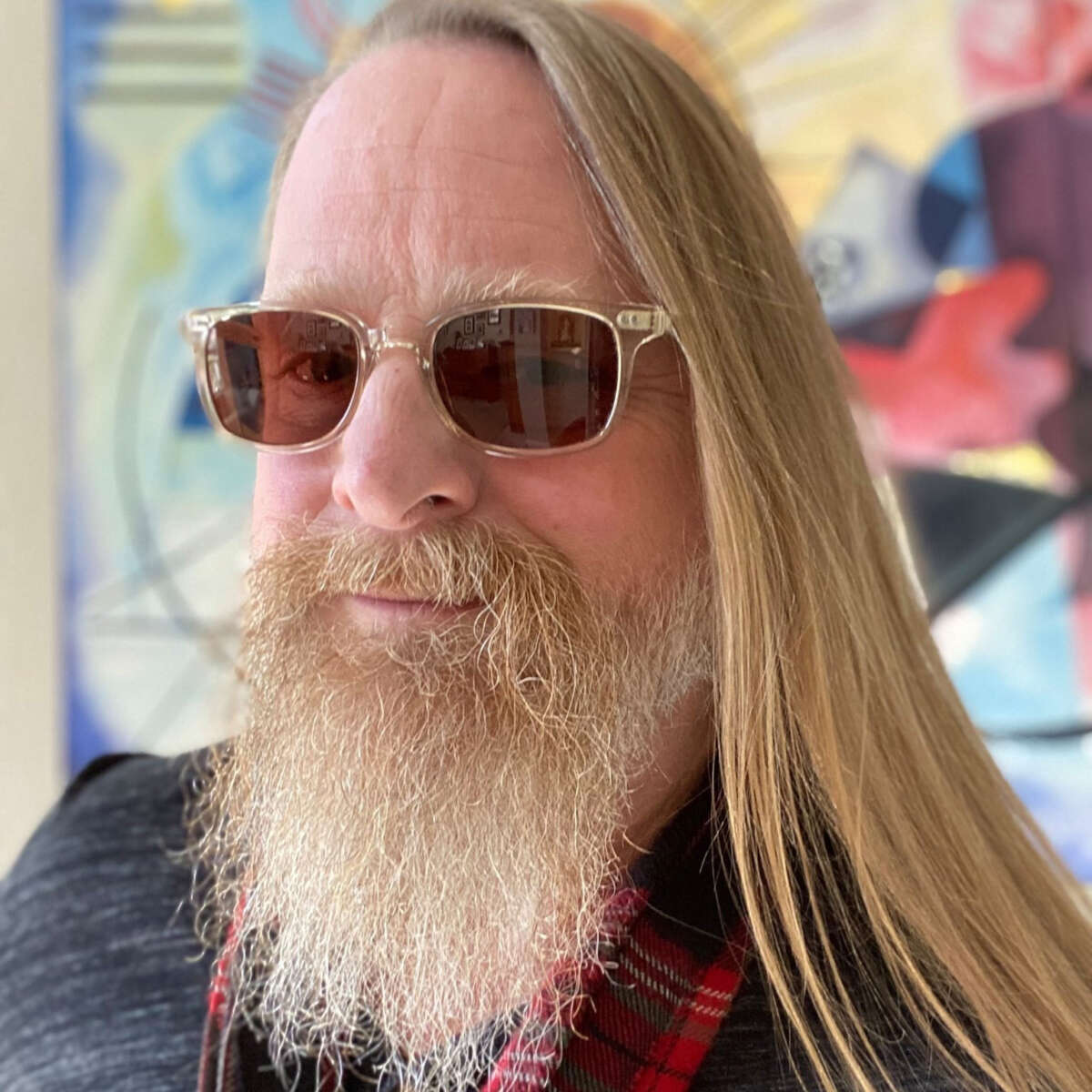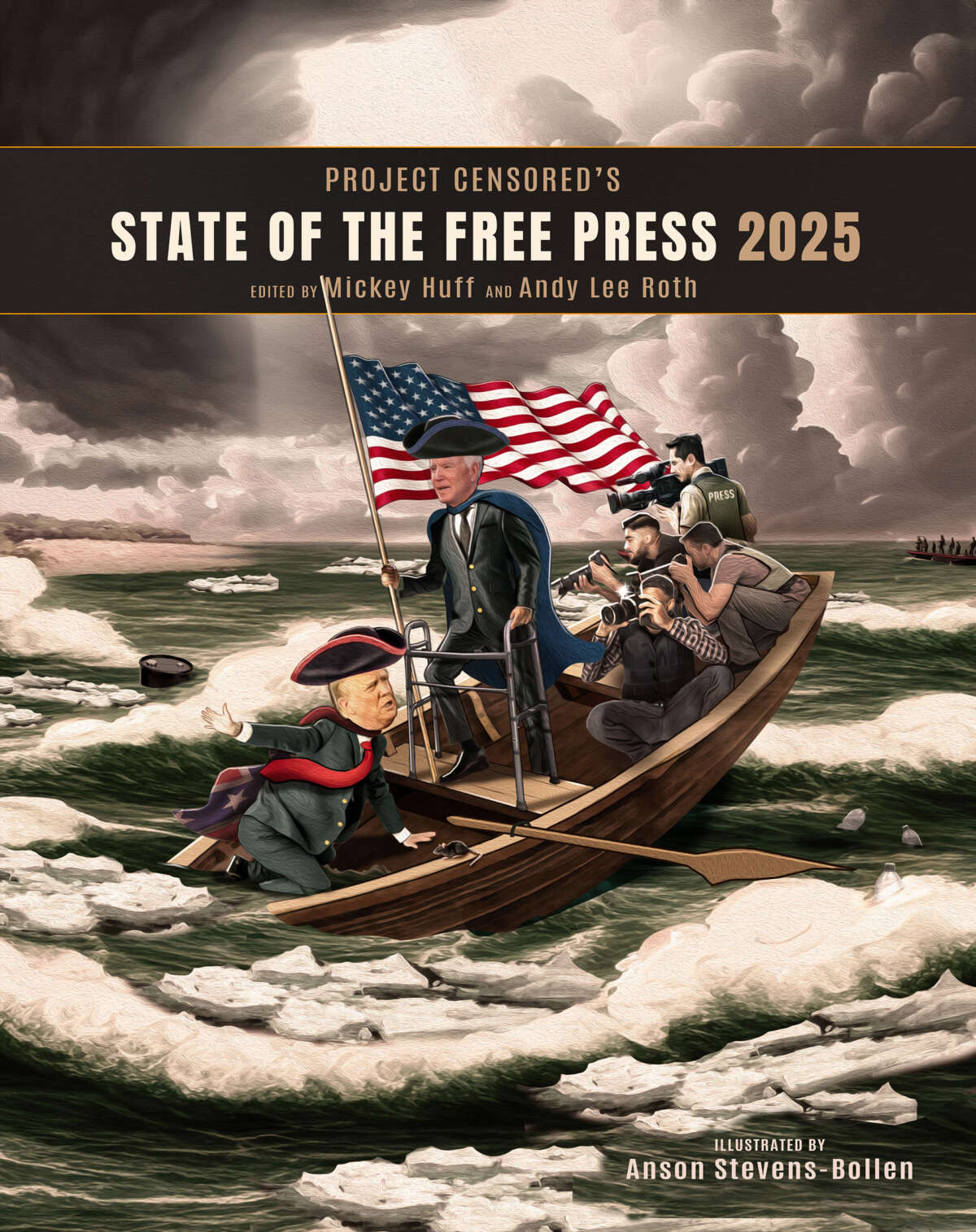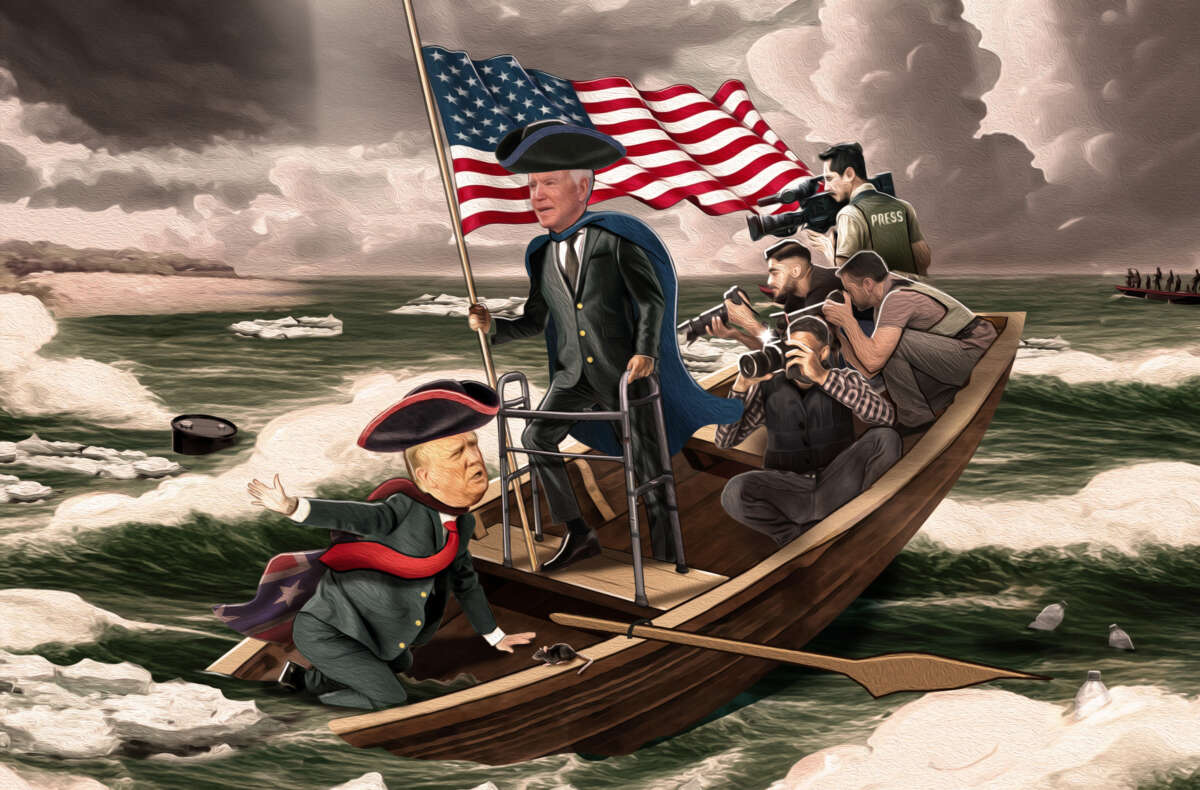Part of the Series
Communities Beyond Elections
Honest, paywall-free news is rare. Please support our boldly independent journalism with a donation of any size.
Every year, Project Censored publishes its State of the Free Press, which takes the pulse of the media and shares the 25 most important but underreported stories of the past year. In State of the Free Press 2025 (The Censored Press & Seven Stories Press, December 3, 2024, paperback), editors Mickey Huff, Shealeigh Voitl and Andy Lee Roth look back on a year in which significant news stories lost out to coverage of celebrities and nonevents.
This year’s book also includes an in-depth analysis of mis- and disinformation. In this interview, the editors discuss how these terms are deployed for political ends, dispel myths about them, and offer an incisive take on the real dangers of mis- and disinformation. As longtime free speech advocates, they also share strategies for combating mis- and disinformation without compromising free speech. The following transcript has been lightly edited for length and clarity.
Peter Handel: Since the first Trump administration, we’ve heard a lot about misinformation and disinformation. How do these two differ? How are they different from or comparable to propaganda?
Shealeigh Voitl: These are terms that should not be used interchangeably. Misinformation often happens accidentally. People hold or share false or mistaken beliefs without ever realizing they’re inaccurate. Like last year, when several X (formerly Twitter) users warned of an earthquake they believed occurred in Dubai, but in fact, it was the demolition of a nearby skyscraper.
By contrast, disinformation is intentional and happens when a person or people spread unsubstantiated information to exert influence. Think of former President Donald Trump’s “Big Lie” of a stolen 2020 election, which galvanized members of his base, cementing their loyalty for the most recent 2024 presidential election.
Disinformation uses these deliberate untruths to influence public opinion, bolster existing power structures, and, ultimately, achieve political goals. Bill Yousman explores these ideas in “Eleven Theses on Disinformation (with Apologies to Karl Marx),” his chapter in State of the Free Press 2025, which describes disinformation as a “subset” of propaganda. Yousman’s argument also emphasizes how easily disinformation disguises itself as trustworthy or credible, making it especially dangerous in a time of rapid digital communication.

How does the corporate ownership of most U.S. establishment media contribute to this problem? Are there recent examples of this? And how do you think it needs to change?
Andy Lee Roth: Corporate news is filtered news. It not only reflects corporate interests but also serves the political agendas of those in positions of power.
Recall, for example, the firestorm The New York Times ignited on December 31, 2023, when it published “Screams Without Words,” which allegedly documented the mass rape of Israeli women by Hamas on October 7, 2023.
On publication of the Times’s report, independent journalists raised serious questions about the credibility of the article’s key sources and the troubling fact that one of the story’s authors was a former Israeli intelligence official with no background in journalism.

In addition to independent journalists, media scholars also sought to hold the Times accountable for its flawed report. In April 2024, some 200 professors of journalism and media scholars from across the U.S. sent an open letter to the publisher, expressing concern about the story’s integrity and the editorial judgment that led to its publication. Their letter noted that the impact of the newspaper’s report was “impossible to fathom” because it “fueled the fire at a pivotal moment” when there was an opportunity to contain the situation in Gaza before it devolved into what the International Court of Justice has deemed the “plausible” realm of genocide.
In May 2024, the Pulitzer Prize Board awarded its prize for international reporting to The New York Times for its “wide-ranging and revelatory coverage of Hamas’ lethal attack on southern Israel on October 7.” Although the award did not specifically cite “Screams Without Words,” how could the Pulitzer jury have ignored the unanswered questions and deep doubts raised by the newspaper’s problematic story and its subsequent lack of transparency about the editorial decisions that led to its publication?
This is just one recent, extraordinarily catastrophic example of how corporate news media disseminate disinformation. As Yousman notes in his chapter from State of the Free Press 2025, the Times’s “history of misleading and deceitful reporting” dates back to its coverage of the Russian Revolution and includes slanted coverage of a host of U.S. military interventions. We all remember how the Times notoriously promoted the 2003 invasion of Iraq by the U.S. and its allies through its now-discredited reporting on Iraq’s possession of “weapons of mass destruction.”
Many in the corporate media claimed that Russia was behind major mis- and disinformation campaigns that helped secure Trump’s first win. What do you think of this?
Mickey Huff: Since the 2016 election, many corporate media outlets have contributed to heightened public concerns around the specter of Russian meddling in presidential elections that favored Trump. As we have noted in several of our publications, while there was evidence of Russian meddling, the degree and effectiveness of those efforts were exaggerated, some manufactured, and in many cases have been outright debunked, including by Harvard media scholar Yochai Benkler and investigative journalists like Jeff Gerth, among many others. That hasn’t stopped outlets like MSNBC, CNN, The Washington Post, and other legacy media from turning Russiagate into a cottage industry.

This fixation on Russia serves to distract attention from the corporate media’s widespread, dismal reporting on a variety of key issues. The U.S. has more than its share of problems with hyper-partisanship, sensational infotainment, Team Red/Team Blue propaganda, and its own false news to further political and cultural divides. These issues with the media leave the U.S. public in the dark about the most pressing matters of the day, including a worsening climate crisis, the collapse of the working and middle classes, unattainable and expensive health care, and the nation’s continued funding and support of Israel’s genocide in Gaza, which a majority of the U.S. public opposed even earlier this year.
If we are going to be concerned about Russia, it should be in the context of its war in Ukraine, where ongoing U.S. military support and financing is poking the bear, pushing the Doomsday Clock closer to midnight than ever before.
It is not uncommon now to hear some commentators — even liberal ones, who have traditionally championed free speech — call for government or corporate regulations to combat mis- and disinformation. Project Censored has always been an outspoken opponent of free speech limitation by either the public or private sectors. How do you think the problem should be addressed?
Lee Roth: If we outsource regulation of information to corporate entities or government agencies, then who fact-checks the fact-checkers? As Project Censored has previously noted, corporate news outlets that promote top-down regulation of speech and information tend to sidestep this basic question.
Does it make sense, for example, to authorize NewsGuard to decide what counts as trustworthy or not when we know that its founding advisory board was a who’s who of former Homeland Security, Central Intelligence Agency, National Security Agency, and North Atlantic Treaty Organization officials, not to mention representatives from telecommunication giants such as AT&T?

Instead of top-down regulation, we need bottom-up scrutiny of misinformation and disinformation based on critical media literacy and the principles of ethical journalism. Critical media literacy is for everyone, which is why Project Censored provides a wide range of resources — from trustworthy independent news sources and classroom guides for educators to infographics and short-form videos — that people can use to develop their media literacy skills.
Some citizens may be tempted to approve of free speech regulations given that they come with the promise of routing out dangerous mis- and disinformation. Even if they recognize the value of free speech, they may see this as a necessary, if uncomfortable, compromise. What are some concerns about this stance that you would urge them to consider?
Huff: Some of these concerns have been noted in previous responses here, especially regarding false and misleading reporting from major outlets that not only escaped real scrutiny but garnered awards. On the other hand, many independent media outlets have been subject to varying degrees of admonishment and censorship (e.g., deplatforming, demonetization, shadow-banning) for accurately reporting on similar matters. In terms of public concern regarding mis- and disinformation, there is a double standard when so-called mainstream outlets get a pass or are assumed to be authoritative (e.g., “the paper of record”) while independent ones are automatically deemed suspect.
It’s like we’re living in some kind of bizarro upside-down world, which in some ways exemplifies the problematic “post-truth” world we seem to inhabit since the 2016 election. It should be noted that the 2016 Oxford Dictionary “Word of the Year” was “post-truth.” As Trump returns to the White House, the “Word of the Year” for 2024 is “brain rot.” It seems like a pattern is emerging, with social and corporate media playing a significant role in creating more “low-information voters.”
Again, Yousman’s chapter in our latest book addresses the many challenges of balancing free speech and free press rights while managing the increasing flow of mis- and disinformation, especially online. As Lee Roth noted, efforts to regulate and curate such content is a very slippery slope, whether by government or by proxy via corporate entities, especially in Big Tech. Support for such censorious measures, even if seemingly well-intentioned, creates a hierarchy of information often buttressed by confirmation bias and status quo conditioning. What we need is more critical thinking and critical media literacy education, so we can help teach the public how to think, not what to think, spurring more meaningful civic engagement.
Among more recent attacks on free expression and press freedoms done in the name of combating alleged misinformation, House Resolution 9495 passed the House (with 15 Democrats supporting) and would give the Treasury secretary unilateral power to remove by decree the 501(c)(3) status of any nonprofit for “supporting terrorism.” The nonprofits already targeted by this bill include mostly organizations that oppose the genocide in Gaza and are human rights advocates for Palestinians, but it will impact other left-leaning nonprofits as well under the incoming Trump administration. Should the bill pass, even if nonprofit status isn’t revoked, the looming threat would be an ever-present chilling effect. Such censorship is beyond problematic and it must be resisted at every turn.
What is one specific thing anyone can do to make themselves more news literate and less vulnerable to mis- and disinformation?
Lee Roth: You can learn a lot by looking at the sources cited by journalists in their reporting. For any given story, focus on who’s treated as an authorized source by the news outlet. In other words, who is quoted in print articles, and who gets to speak when a TV story includes sound bites? Do those sources reflect a diversity of perspectives on the topic, or have some relevant viewpoints been marginalized or blockaded? Do those sources provide critical leverage on the topic, or are they all saying the same thing?
Establishment news outlets tend to rely on official sources, whether they’re government or corporate officials. Even when news outlets seek to fulfill their heralded role as watchdogs by alerting the public to abuses of power, reporting based on official sources and conventional narratives tends to reinforce the status quo.
As we at Project Censored often note, narrow definitions of who counts as “newsworthy” often reflect a fundamental assumption that “news” is primarily about what people in power do and say. That definition promotes the subtle but nasty misconception that most of the public is irrelevant or inconsequential when it comes to addressing important political issues.
Many of the independent news stories highlighted by Project Censored tell a different kind of story, focused on how ordinary people, acting together, empower themselves to confront systemic injustices and abuses of power. For example, this edition of State of the Free Press features reporting on Indigenous activists in Panama shutting down a notorious copper mine that threatened local water supplies and forests; and on activists in New York, Colorado and California who publicly protested outside the offices of insurance companies that still support fossil fuel projects for those companies’ role in the climate crisis.
Reporting like that not only informs the public, it can also inspire people to organize and take action on comparable issues affecting their own communities.
Media that fights fascism
Truthout is funded almost entirely by readers — that’s why we can speak truth to power and cut against the mainstream narrative. But independent journalists at Truthout face mounting political repression under Trump.
We rely on your support to survive McCarthyist censorship. Please make a tax-deductible one-time or monthly donation.
